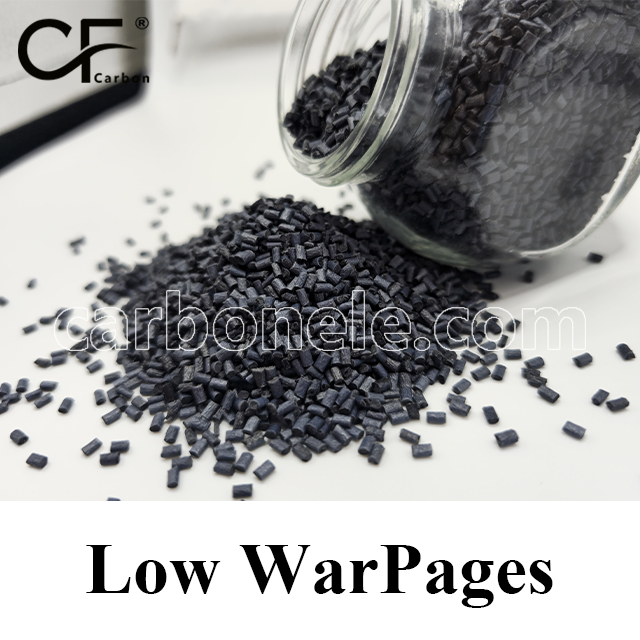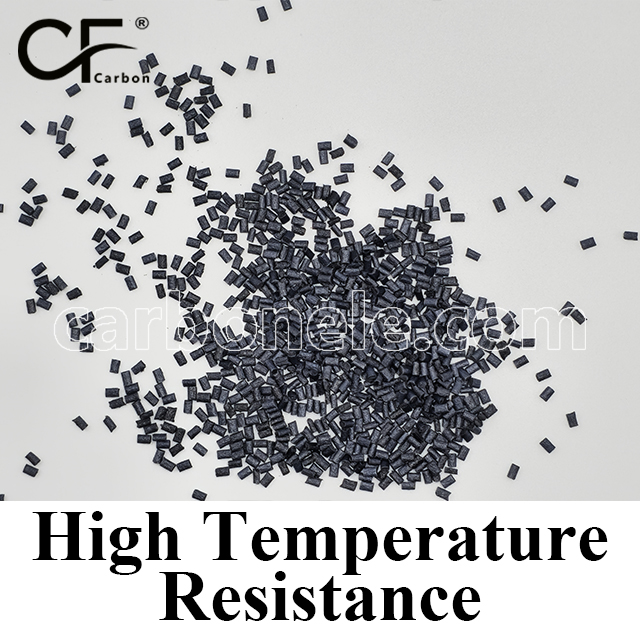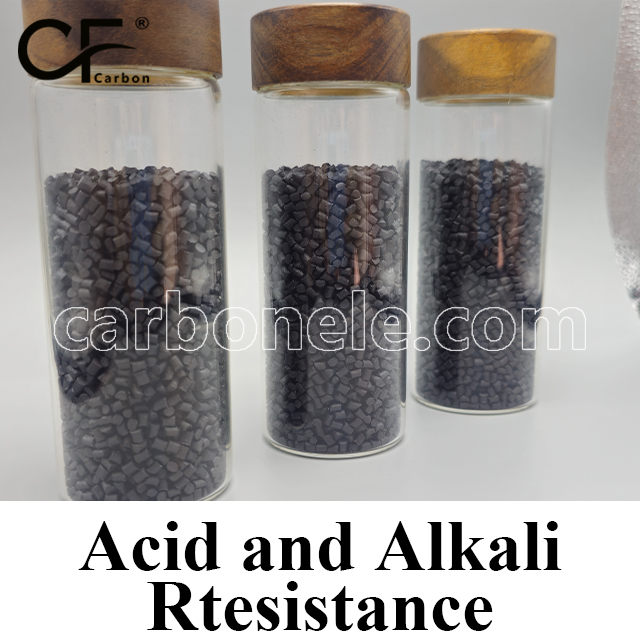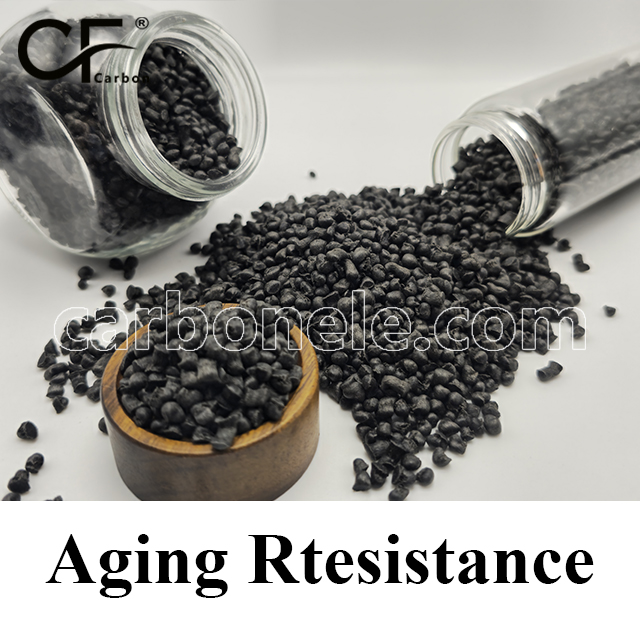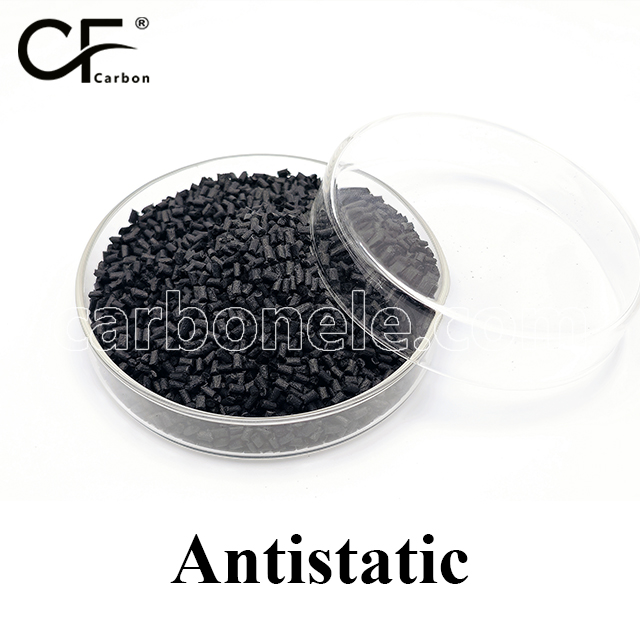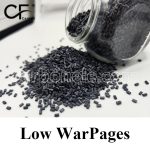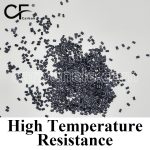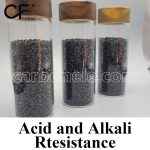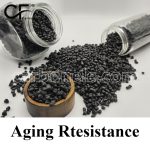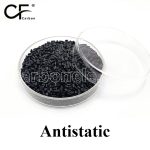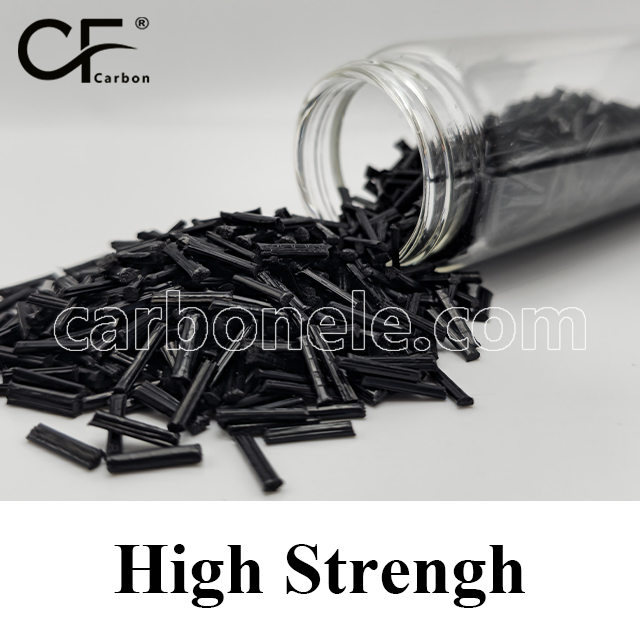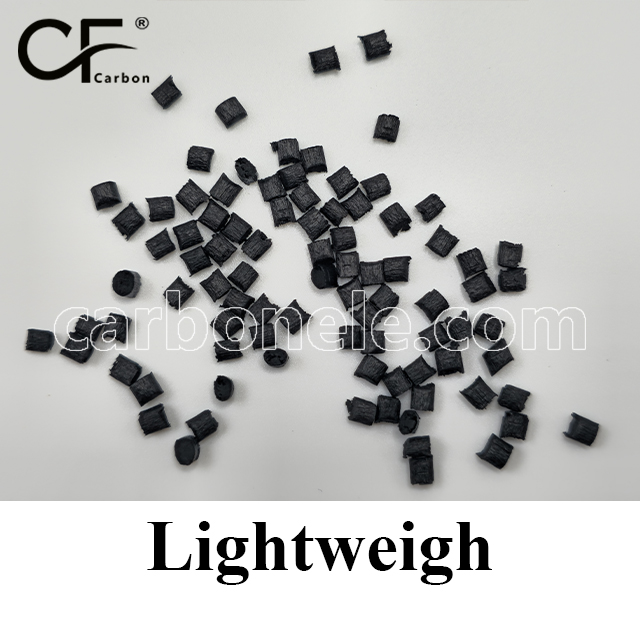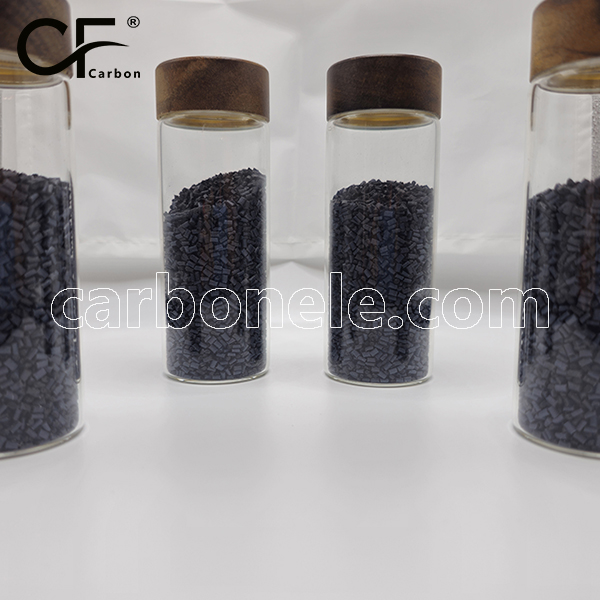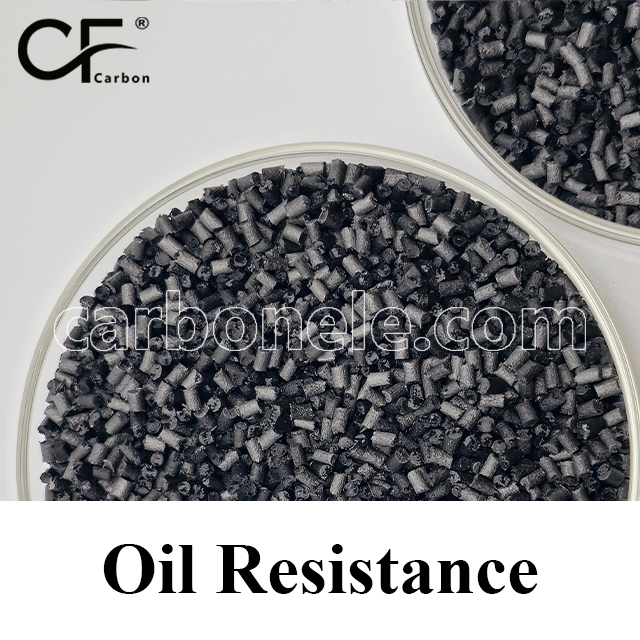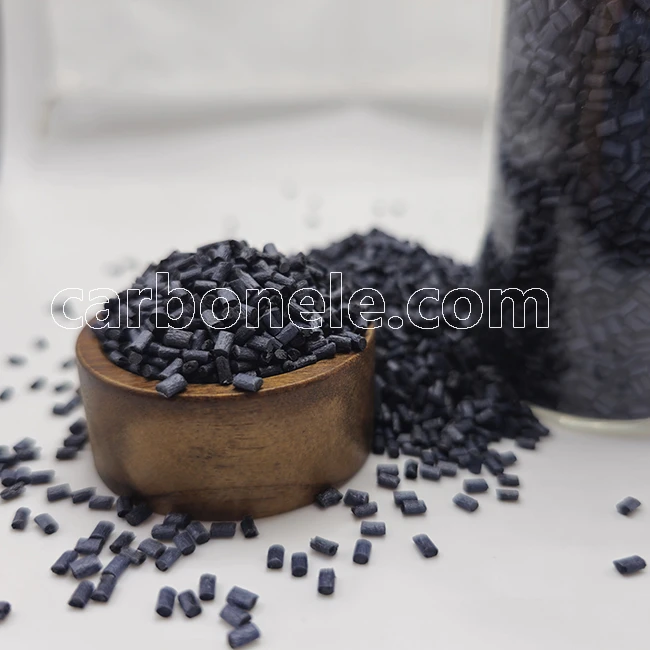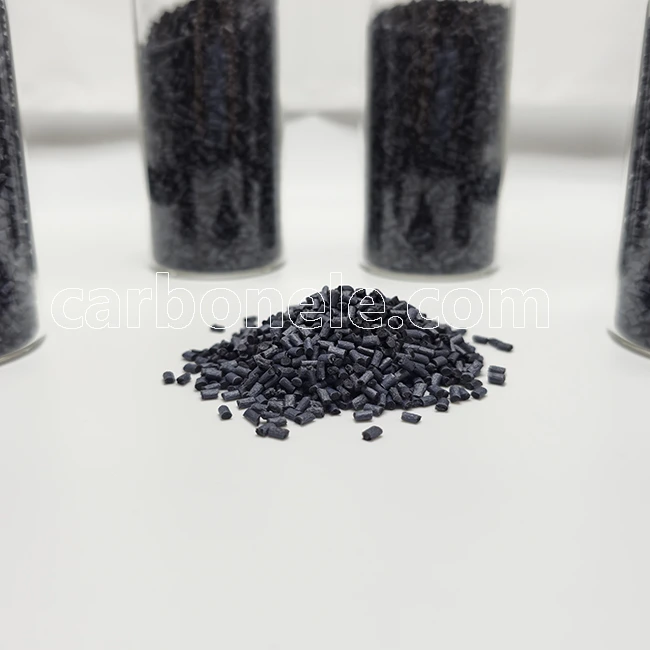PPS-CF60 is a high-performance plastic with 60% carbon fiber, offering excellent strength, stiffness, and dimensional stability. It performs well under high loads, extreme temperatures, and aggressive chemicals. Ideal for demanding applications in automotive, aerospace, and industrial sectors, it provides outstanding wear resistance and thermal stability.

High-Strength PPS-CF60 Composite Materials
- Model number: PPS-CFB-CA6
- Matrix Resin: Polyphenylene Sulfide (PPS)
- Reinforcing Filler: Carbon fiber
- Appearance: Granules
- Grade: Injection/extrusion grade
- Packaging: 25kgs/bag
PPS-CF60 Material Overview
PPS-CF60 (Polyphenylene Sulfide with 60% Carbon Fiber) is a high-performance engineering plastic designed for the most demanding industrial applications. With 60% carbon fiber reinforcement, PPS-CF60 provides superior strength, stiffness, and dimensional stability, making it ideal for high-load, high-stress environments. This material performs excellently under extreme temperatures and aggressive chemical exposures, ensuring long-term durability and reliability.
Mechanical Properties
PPS-CF60 is optimized for structural applications requiring exceptional strength and stiffness, along with excellent chemical resistance and dimensional stability. The 60% carbon fiber content significantly enhances mechanical performance, especially in high-load and high-stress environments.
- Tensile Strength: ≥ 300 MPa (Increased due to higher carbon fiber content)
- Flexural Strength: ≥ 500 MPa
- Impact Strength: ≥ 65 kJ/m² (Adjusted for higher carbon fiber content)
The increased carbon fiber content improves rigidity and strength, making PPS-CF60 ideal for heavy-duty structural components exposed to extreme mechanical stresses.
Thermal and Chemical Resistance
PPS CF60 retains excellent properties even under the harshest conditions, including high temperatures and aggressive chemicals.
- Heat Deflection Temperature (HDT): Approx. 360°C (Increased with higher fiber content)
- Long-Term Service Temperature: Up to 300°C (Enhanced stability)
- Chemical Resistance: Outstanding resistance to oils, solvents, acids, alkalis, and other aggressive chemicals.
The 60% carbon fiber content ensures PPS-CF60 maintains exceptional performance in chemically aggressive environments and high temperature conditions.
Wear Resistance and Processing Characteristics
With 60% carbon fiber reinforcement, PPS CF60 excels in wear resistance, particularly under high-friction or repetitive motion applications.
- Wear Resistance: Excellent performance under high friction conditions.
- Processing Methods: Suitable for injection molding, extrusion, and other thermoplastic processing methods. While processing temperatures for PPS CF60 are higher than those for lower carbon fiber grades, they remain manageable within typical processing ranges for PPS based materials.
The enhanced carbon fiber content increases durability, rigidity, and wear resistance, allowing PPS CF60 to excel in high-stress, high-abrasion applications.
Environmental Adaptability
PPS CF60 is well-suited to various environmental conditions. It has minimal water absorption, maintains dimensional stability, and keeps its mechanical properties in outdoor, humid, or chemically aggressive environments.
Applications
PPS CF60 is designed for demanding applications that require superior mechanical strength, thermal stability, and chemical resistance. Typical applications include:
- Automotive Industry: Components such as gaskets, seals, connectors, and structural parts exposed to high mechanical stress and temperatures.
- Industrial Manufacturing: Heavy duty gears, bushings, bearings, and other components subjected to high mechanical stress, high temperatures, and aggressive chemicals.
- Electronics: Structural components that need to resist high temperatures and chemicals, such as enclosures and housings.
- Aerospace: High performance components that must withstand extreme temperatures, mechanical stress, and harsh chemicals while maintaining dimensional stability.
Summary Table for PPS-CF60
| Characteristic | Value/Description |
|---|---|
| Carbon Fiber Content | 60% |
| Tensile Strength | ≥ 300 MPa |
| Flexural Strength | ≥ 500 MPa |
| Impact Strength | ≥ 65 kJ/m² |
| Heat Deflection Temperature | Approx. 360°C |
| Long-Term Service Temperature | Up to 300°C |
| Chemical Resistance | Outstanding |
| Water Absorption | Very low |
| Processing Methods | Injection molding, extrusion |
| Wear Resistance | Excellent under high friction |
If you want to get more information about PPS-CF60, you can visit our Youtube.
Friction coefficient of PPS-CF
The friction coefficient of PPS (Polyphenylene Sulfide) typically ranges from 0.3 to 0.45, while PPS-CF (Carbon Fiber Reinforced Polyphenylene Sulfide) has a lower coefficient, generally between 0.2 and 0.35. The addition of carbon fiber improves hardness, wear resistance, and reduces friction, making PPS-CF more suitable for high-load, high-temperature, and high-friction applications.
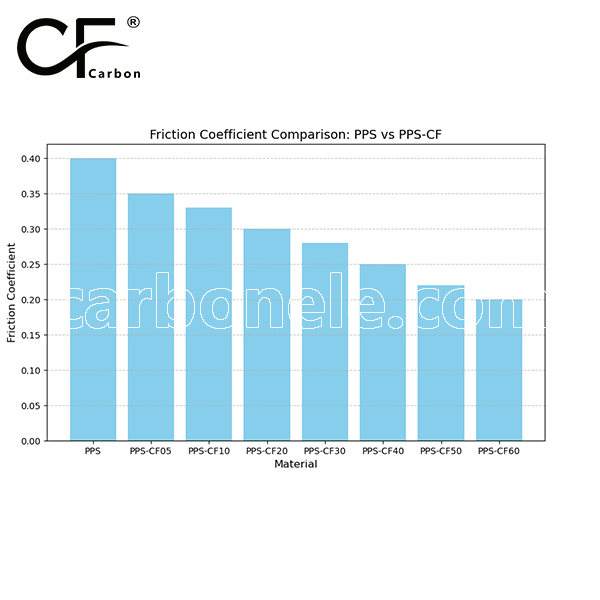
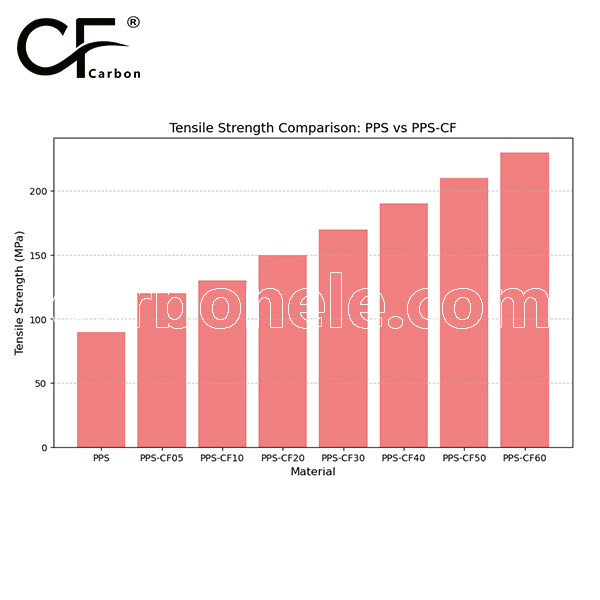

Frequently Asked Questions
Carbon (Xiamen) New Material Co., Ltd. aims to provide buyers with "one-stop" worry-free high-quality services. Here you can find all information about carbon fiber engineering plastics. If you still have questions, please send us an email for consultation!
-
How can I contact the manufacturer of a product that interests me?
When you find a product you are interested in, you can contact the manufacturer directly by sending an email and we will get back to you as soon as possible.
-
How do I find the products that interest me?
All you need to do is enter the keyword, product name in the search window and press the Enter key on your keyboard. Your search results page will then be displayed. You can also search within the product category pages on the home page. Each category is divided into subcategories, allowing you to refine your search and find products that interest you.
-
Where will I find a buying guide?
Please contact our after-sales service directly and we will provide you with a comprehensive operating guide.
-
What are CF Reinforced Thermoplastic Composites?
CF Reinforced Thermoplastic Composites are materials where carbon fibers are incorporated into a thermoplastic matrix. They combine the strength and stiffness of carbon fibers with the processability and recyclability of thermoplastics. For instance, they are used in automotive parts like bumper beams.
-
What are the benefits of CF Reinforced Thermoplastic Composites over traditional composites?
The key benefits include faster production cycles, easier recyclability, and better impact resistance. They also offer design flexibility. An example is in the manufacturing of consumer electronics casings where complex shapes can be achieved more easily.
-
How are CF Reinforced Thermoplastic Composites processed?
Common processing methods include injection molding, extrusion, and compression molding. Injection molding is widely used for mass production. For example, in the production of small components for the medical industry.
-
What industries use CF Reinforced Thermoplastic Composites?
They are utilized in aerospace, automotive, medical, and sports equipment industries. In aerospace, they can be found in interior components. In the medical field, they might be used in prosthetics.
-
How does the carbon fiber content affect the properties of the composites?
Higher carbon fiber content generally leads to increased strength and stiffness but may reduce ductility. A moderate content is often balanced for specific applications. For example, a higher content might be preferred in structural parts of a race car.
-
What are the challenges in using CF Reinforced Thermoplastic Composites?
Challenges include higher material costs, complex processing equipment requirements, and ensuring uniform fiber dispersion. Issues with adhesion between the fibers and the matrix can also arise. An example is in achieving consistent quality in large-scale production.








